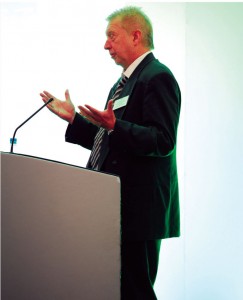
Over 150 doctors, case managers, personal injury lawyers, social care workers, voluntary organisations and care providers attended the meeting. The programme highlighted the need for long-term rehabilitation following a brain injury to maximise optimal patient recovery – a key message that is generally not accepted by funders.

Professor Michael Thaut from the Centre for Biomedical Research in Music at Colorado State University, USA began the day with a stimulating presentation on the role of music in rehabilitating people with brain injury. Research has demonstrated that auditory rhythm has a profound effect on the motor system and a large number of clinical studies have looked at the effectiveness of rhythm and music to produce functional change in motor therapy for stroke, traumatic brain injury (TBI), Parkinson’s disease and other conditions. Professor Thaut illustrated his talk with several video case studies to show the positive effect of rhythmic auditory stimulation in improving gait and upper extremity function.
Dr David Sharp, NIHR Research Professor and Consultant Neurologist at Imperial College, London discussed the use of advanced neuroimaging to diagnose the underlying causes of common cognitive impairments such as memory and attention.
“TBI is a massive clinical, social and economic problem which isn’t reflected in funding for research in the UK” said Dr Sharpe. He discussed a study where head injury was found to be associated with an increased vulnerability to death from a variety of causes, for at least 13 years after hospital admission. From the cohort of 767 people, 40% had died after 13 years. Dr Sharpe focused on the common cognitive impairments in areas such as memory and attention which limit recovery and are difficult to treat. Advanced MRI techniques such as diffusion tensor imaging can now facilitate identification of those areas in the white matter where damage has occurred.
The use of psychological tests to assess executive function and the development of techniques and technologies to aid rehabilitation were discussed by Dr Andrew Worthington, Clinical Neuropsychologist and Director of Headwise. One project underway to assist executive problems is ‘CogWatch’, a European Commission funded research project involving six partners including Headwise, for the rehabilitation of stroke patients. Co-ordinated by the University of Birmingham, CogWatch is developing advanced and intelligent common objects and tools which will help to re-train patients on how to carry out activities in their daily life by providing persistent multimodal feedback. The CogWatch tools will be part of a personalised home rehabilitation system and silently monitor the patient as they complete tasks. When an error is detected, CogWatch will provide helpful and relevant guidance cues to assist the patient in completing the activity.
Sleep disorders are both under-recognised and under-reported and Professor Michael Barnes, UKABIF Chair said: “Overnight sleep disorders and excessive daytime tiredness are very common after a TBI; about 50% of people have some form of long-term sleep disorder”. Professor Barnes discussed the range of sleep disorders including sleep disturbance, circadian rhythm disorders and hypersomnia. The most serious sleep disorder after TBI is obstructive sleep apnoea and one study found it occurred in nearly a quarter of people. This causes actual cessation of breathing during the sleep, often in association with snoring. The diagnosis of the nature and type of sleep disorder is a specialist area and most regional centres have a sleep clinic, usually run by neurologist or a sleep specialist.
Visual disturbances are another under-recognised aspect of ABI. “It is not just about vision because many people with TBI people have normal vision, but other visual issues can be hidden” said Mr Mark Menzes a neuro-developmental optometrist. Unfortunately, many patients with visual problems after a stroke or head injury fail to receive an accurate diagnosis. Each case is different and the difficulty each patient has depends on the severity and location of the injury. Some of the most common visual problems include loss of visual field, visual spatial disorders and visual neglect, vertigo, dizziness and impaired eye movements including double vision, eyestrain and difficulty in reading. The visual problems of ABI may affect nearly all aspects of vision and can hinder normal recovery; early vision evaluation is therefore crucial.
“The effect of peer support in recovery and rehabilitation is now well-proven” said Ava Easton, Chief Executive Officer of The Encephalitis Society in a presentation that was strongly endorsed by the audience. Peer support refers to initiatives where members of self-help organisations and others meet as equals to give each other support on a reciprocal basis to help one another through recovery and rehabilitation. Peer support does not exist in a clinical setting and given the current resource restraints then involvement of the voluntary sector is crucial.
Sue Thomas, Chief Executive of Neurological Commissioning Support delivered a comprehensive overview of the NHS changes. The commissioning of services for Acquired Brain Injury will be both specialised and commissioned by the clinical Commissioning Groups (CCGs). A large element of neurology will be commissioned locally by CCGs and each CCG board must include GPs, at least one registered nurse and a doctor who is a secondary care specialist. Some CCGs already have a GP neurology lead but many do not.
For further information, please contact: Chloë Hayward, UKABIF T: 0845 6080788 M: 07903 887655 E: info@ukabif.org.uk www.ukabif.org.uk